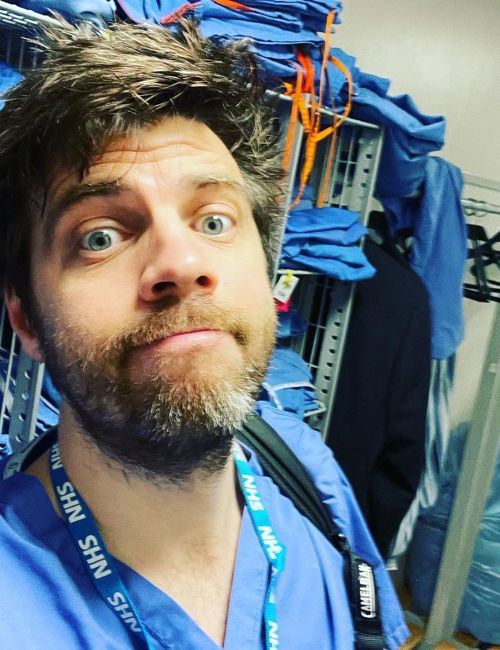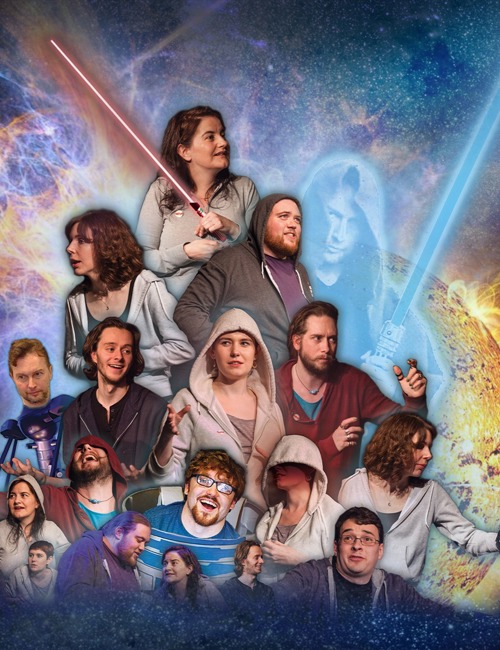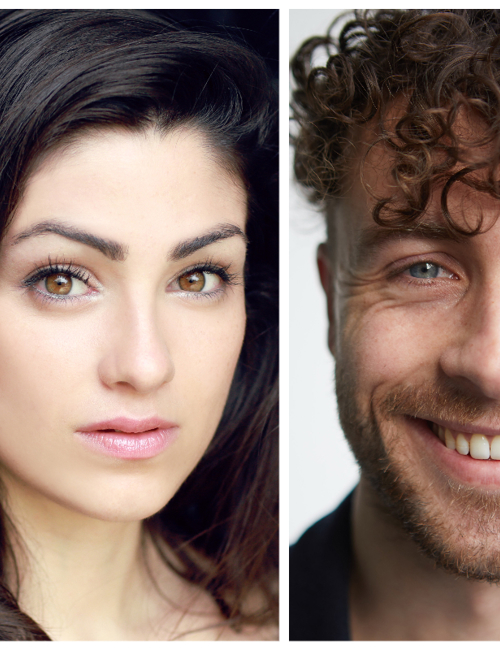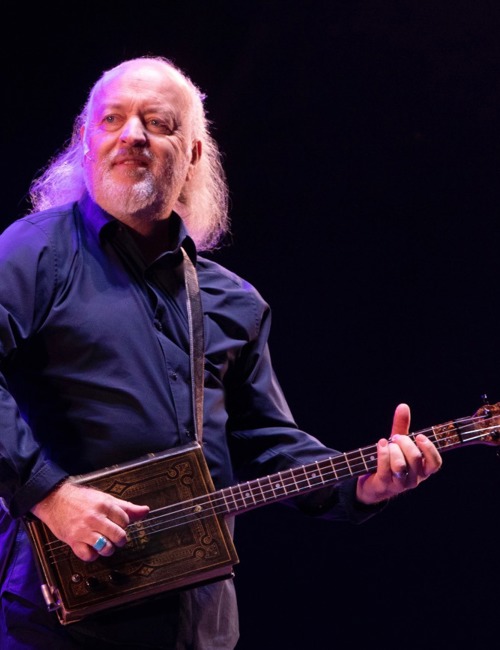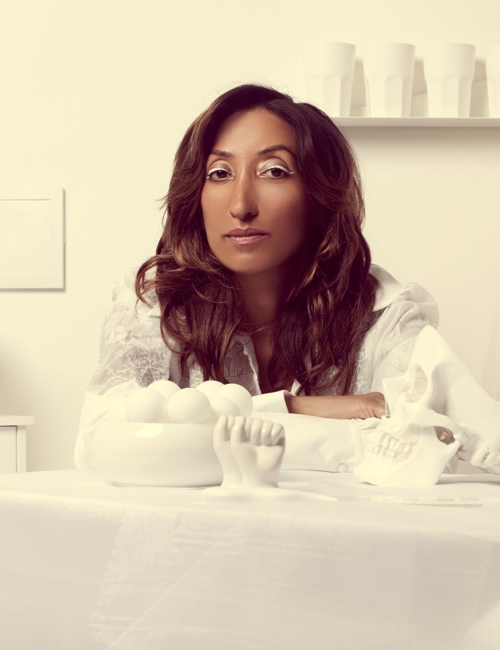As award-winning comedian Michael Akadiri brings his new show Trust Me, I'm a Daddy to the Canalhouse, he speaks to Leftlion about his journey this far...

So Michael, give us a sneak preview of the show.
It’s a very entertaining, enlightening and funny stand-up comedy show. It’s called, Trust Me, I'm a Daddy, so hopefully that gives people an idea of what the show is about. My background as a doctor, but also my life as a new parent. I thought it would be interesting to juxtapose that with my experience of being parented by my father.
You’ve uploaded some lovely clips of your father with you.
Thank you. They’re on YouTube. It was about his journey and the sacrifices he went through. My dad was born and raised in Nigeria, but came over here in his 20s. Having my own son made me reflect on the sacrifices my father made for me.
Are you a doctor who tells jokes or a comedian that heals folk?
Good question. When I started, I was the former, but in recent years, I'm the latter. Comedy is not going to cure someone of a very serious medical condition, but if they're feeling low after a bad day, comedy has healing power. A night of laughter can change your mood and your outlook, particularly if the comedian is talking about topics personal to you. They can show you there's light at the end of the tunnel.
Are you nervous before a gig?
Always. If it's a gig that’s really, really important, then there's this level of ‘oh, my goodness, oh, my goodness, oh, my goodness!' But nerves settle once the first joke lands. Probably the most nervous I've been in the last year, was a live performance on Channel Four for Stand Up for Cancer. It was tough, because we were only given a two-minute set. There was a studio audience, so no laughing track. The first joke didn't get what I wanted. So, ‘oh my goodness!' But fortunately, the rest of it was absolutely fine. Rob Gilbert, who was presenting, was really friendly and said I was good. It's nice when a comedy legend gives you those words.
We as artists hold a mirror up to society
What about coming off stage immediately afterwards?
Euphoria. Every time you get a big laugh, it's euphoric. The dopamine, the serotonin, gets this huge hit, and you come off stage, you're floating. You are the man, you're the woman, you're whoever you are. People are wanting to take photos with you after the show. It can go to your head.
Afterwards you're at the bus stop, and the driver drives over a puddle and splashes you and you're crashing back down to earth. But you need that. In this industry, if everyone's telling you you're amazing or you're performing to thousands, It's easy to forget who you are. So, taking the bus is very humbling!
Is stand-up as an art form?
Yes, I love stand-up. You can make people laugh. You can make people think. You can challenge their perceptions, their biases. We as artists hold a mirror up to society and say, this is how it is. And if that makes you feel uncomfortable, so be it. I've got a joke in the show about a popular celebrity and their lack of presence in their child's life. And everyone goes, ‘oh’, like, I've said something controversial. So that's an example where you hold the mirror up and everyone's like, ‘Oh!’ I think a good comedian challenges what you think. Everyone's got different opinions, politics, backgrounds, and if you're sitting in a comedy show and you've not been challenged, then it could be very funny but failing.
A Guardian review called calling you politically punchy.
I'm very joke focused. It's meant to be funny first, and if you can slide in some opinions after that, then great. I speak my mind. But when you take a stand, you become political. But the world is political. Everything is political. As we had with Grenfell Tower. All the decisions made were political. So everything's political. I think comedy should come from a place where it's a point of view you have, and it should be a fun, but you're making your argument to that effect. The best comedy, in my opinion, is where there's a strong point of view. If you're trying to play both sides, it doesn't really work.

How did you go from being a doctor to a comedian?
It happened totally by chance, in terms of people saying, at medical school, ‘oh, you're funny. You’ve got banter’. I enjoyed throwing in one liners to make people laugh. But I never considered it as a career. That was beyond my wildest dreams. And I said, let's just see. I signed myself up for an open mic night in Greenwich, near my parents’ house. Little did I know it was a gong show where audiences seek blood and kick people off if they’re not funny. My aim was to last five minutes. I got to three and a half, and I thought, for a first ever go, that's pretty decent. My first joke got a big laugh, and I caught the comedy bug, and off I went.
There’s another way I can explain this. Okay, can I make people laugh for an hour? Okay, can I make people around the country laugh? Can I make people around Europe laugh and then the world laugh? Your goalpost always moves, and I guess you’re never really satisfied. The top comedians in the world are doing arenas, and they're not satisfied. It's clearly not about money. Those people already have a lot of money. They can retire and not tell another joke, yet they're still going. So, yeah, it's that addiction.
What advice would you give young people wanting to get into stand-up?
Write about what you know, about what you're interested in. And just go out and perform it. But if you go in front of an audience and they're stone faced, then you must be able to take no from an audience. Be humble enough to accept that they're right and you won't always be right. Absolutely. There's no shortcuts in comedy. You can have friends in the industry. You can be friends with celebrities. They could even ask you to open for them. But, when you're on that stage, the audience knows when something is good, and when something isn't so good. You can't escape that. So, you have to do the work. You have to be in the club, you have to be working on your material. And that's the only way you get better. No one can do it for you.
Have you visited Nottingham before?
I was a medical student at Nottingham University. Yeah, five years from 2016.
Wow! So, what do you love about Nottingham?
I'm born and bred in London. London is the only city I knew, and that's obviously a big city. So, I enjoyed Nottingham because it's a city, but I could get around reasonably well. Going to the city centre, you could do a bit of shopping. You could eat out. It was home away from home. Uh, obviously you're there for five years, staying in the student parts of Lenton. Then we moved a bit upmarket, to Wollaton. And, yeah, for a year we were really leaving the Vida Loca. I really enjoyed it. I see this like a homecoming. That's my affinity and affiliation with Nottingham. It's a decent city. I can do comedy here. I've got personal connection with the people.
Are people always coming up and asking you for medical advice?
I've done a few cruise gigs. And the worst thing about a cruise gig is no escape, and they come up to you at the worst moments. I'm a doctor too, and you tell your doctor anything, people just walk up and tell you, whatever. There's no filter. I'll be using the urinal. Some guy will come up to me, ‘all right, mate, I've got one for you’. I'm trying to urinate. This is not the time to start telling me jokes. And this joke was so old school. I couldn't repeat it to you now. The wrong time, wrong place, wrong joke!
That's leads onto the whole black British concept
Where would you like to be in five years’ time?
I’ll be 37, still a youngster. Hopefully, a good footing in comedy and touring much bigger venues. I like to think I'll be closer to being a household name. I'm at the stage now where I have to hustle to get people through the door, which is fine. I think everyone's got to hustle. Go through that, quote, unquote, hardship, because it's building character. But I want to be able to say, ‘Oh, I'm doing Shrewsbury on a Tuesday’, and 300 people turn up the theatre. If I can achieve that, I'll be a very lucky man.
You're the son of an immigrant. Do you have a different perspective on British life?
Absolutely, yeah. My house was very Nigerian, my parents are Nigerian immigrants. There's a Nigerian comic called Funmbi who has a joke where his mum says, ‘outside is the UK, inside this house is Nigeria’. And that demonstrates how I was brought up. We eat Nigerian food. We go to Nigerian parties. We wear Nigerian traditional wear. My upbringing was very Nigerian, but in primary school, there wasn't a strong Nigerian community that I could identify with. As I've gotten older, maybe with the prevalence of music, such as Afro beats, it's more mainstream. There definitely is more of a community around being Nigerian. That's leads onto the whole black British concept. Stormzy headlining in Glastonbury, for example. It's not a concept you could imagine 20 years ago. So, absolutely, a community gets formed, and there are now events targeted specifically at people of African descent in London. Things like that, wouldn't have been a thing 20 years ago. But that's the thing, Britain's such a melting pot.
Was there anything else you wanted to get across?
There is discount for NHS staff and also students. I'm not a rich man by any stretch, but I know that my NHS colleagues sometimes have a thankless path, long hours and whatnot. This is my way of saying ‘Thank You’.
Michael Adkiri's 'Trust Me I'm a Daddy' plays at the Canalhouse on Sunday 10th of November 2024.
We have a favour to ask
LeftLion is Nottingham’s meeting point for information about what’s going on in our city, from the established organisations to the grassroots. We want to keep what we do free to all to access, but increasingly we are relying on revenue from our readers to continue. Can you spare a few quid each month to support us?
